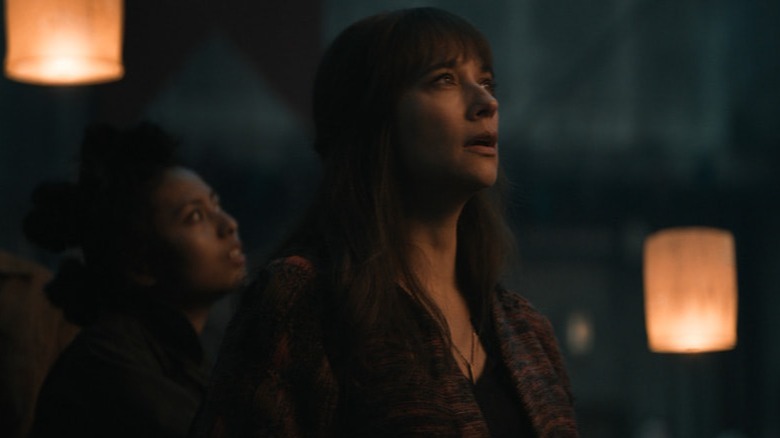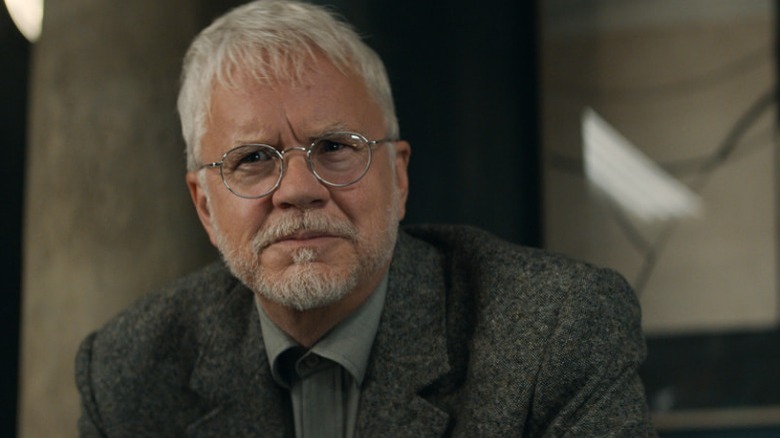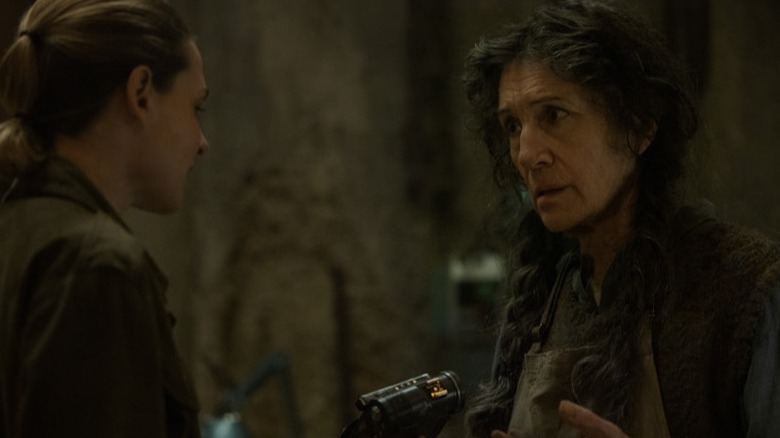Silo Review: A Post-Apocalyptic Neo-Noir That Thrives On Intrigue And Steady World-Building
Apple TV+ is quietly cornering the market on high-quality literary adaptations; the streamer may be best-known for original series like "Ted Lasso," but its adaptation game is surprisingly strong. From standouts like "Pachinko," "Foundation," and "Black Bird" to more polarizing offerings like "Lisey's Story," "Defending Jacob," and "The Essex Serpent," the streamer is constantly fine-tuning the art of the page-to-screen projects. The latest book adaptation from them is especially ambitious, and it's a risk that largely pays off. The 10-episode first season of "Silo," based on Hugh Howey's bestselling novel series, builds a somber yet thrilling world from the ground up — or, in the case of the titular structure, from the ground down.
"Silo" starts with a searingly great premise: a group of roughly 10,000 people is housed in an underground silo, at least 140 years removed from some sort of society-shaking event. Details about the silo's history are cloudy (for a reason — more on that later), but the culture that survivors have built is intriguingly complex. In the Down Deep, as the lower levels are called, mechanics do grunt work and engineers keep a life-sustaining generator running. Elsewhere, doctors shepherd in new life through a fertility lottery, porters run items between floors, and a system of governance involving a sheriff, a mayor, and an all-powerful group called Judicial attempts to keep order.
Silo kicks off with a fantastically compelling central question
With "Justified" creator Graham Yost at the helm, "Silo" ultimately turns its richly developed premise into a multi-layered noir, with mechanical specialist Juliette ("Dune" star Rebecca Ferguson) serving as its hard-boiled investigator. The neo-noir plot is pretty great, but it's motivated by an inciting incident that's altogether excellent. The show's first two episodes start with an entirely different cast of characters, led by David Oyelowo's Sheriff Holston and his wife, Allison (Rashida Jones). When Allison begins to question the reality of the silo's history as it's presented, it's an awakening that leads her — and later her husband — down a thrilling and existentially terrifying rabbit hole. The series surprises by front-loading itself with the apparent answers to some of its biggest questions, and it's never better than when its characters yearn for knowledge about the outside world.
After a super-strong start, "Silo" doesn't so much waver as shift gears — as the focus slides over to resilient, ruthless Juliette, the show becomes slightly more predictable but never boring. The series sometimes splashes around in familiar waters for a post-apocalyptic story, setting up a dichotomy between powerful people keeping secrets from the public and curiosity-driven rule-breakers hungry for answers. Yet even the most expected elements work well, largely because the world "Silo" crafts is endlessly interesting. The show is paced for maximum intrigue, doling out new chunks of Hugh Howey's cool mythology with each passing episode to keep viewers invested. Everything hinges on a compelling central question: why was the silo made, and is the outside world really all that bad?
A strong ensemble and a high-concept premise
"Silo" ticks towards an answer to that question at a fairly engrossing pace, with the exception of some flashbacks that only sporadically add to the story. As Juliette elbows her way through a mystery involving one unexplained death after another, "Silo" comes to earn its place in the vanishingly rare subgenre of "future noir" — a term author Paul M. Sammon used to refer specifically to "Blade Runner" in his book of the same name. The show is fixated on lofty concepts — truth, beauty, and purpose among them — but it smartly wraps its more philosophical ideas up in a grounded murder mystery that points towards a larger conspiracy within the silo.
David Oyelowo and Rashida Jones may be the show's standout cast members, making a meal out of their limited screen time, but the show also features a strong supporting ensemble. Rebecca Ferguson, whose performance is one of brittle strength that masks quiet hopelessness, is at her best when engaging with talented, committed scene partners like Harriet Walter (who plays her agoraphobic mentor), Tim Robbins (an eccentric intellectual), and Sophie Thompson (an enigmatic fertility specialist). The show frankly has a lot of moving parts, and a few actors seem to be letting the high-concept plot do the heavy lifting for them, but "Silo" also features several standout performances.
Moving pieces that hold our interest
The series ultimately stands apart from standard post-apocalyptic fare thanks to its ability to deftly pull the audience's focus from one point of curiosity to another, keeping us fully absorbed in the details of this strange world all the while. In one episode, the climax centers on whether or not a character will clean off the grime-covered security camera that faces the apparently barren outside world, and the payoff is somehow one of the show's most emotional moments. In another, an illegal "relic" from our present-day serves as the gateway to a different world. Much of yet another episode involves a grueling attempt to repair a massive generator, and as the back-breaking, high-stakes action unfolds, "Silo" briefly starts to feel like an episode of "Chernobyl." The show works like the gears of that generator — each piece is crucial to the function of the whole, even if some are more dazzling than others.
"Silo" isn't a perfect sci-fi series, but it's a perfectly compelling one, loaded with enough intrigue, existential dread, and well-executed world-building to keep viewers hooked through its 10-episode first season and, hopefully, beyond.
The first two episodes of "Silo" stream on Apple TV+ on May 5, with subsequent episodes dropping weekly on Fridays.



